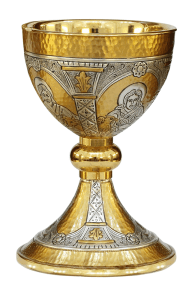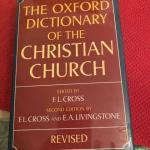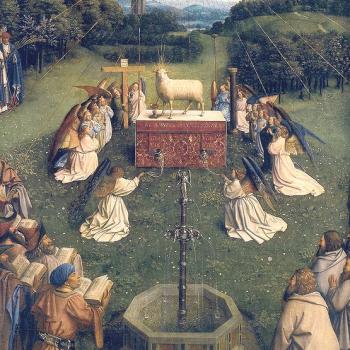Collin Brooks runs a YouTube page devoted to defending Reformed Protestant theology and critiquing Catholicism and Orthodoxy. His words will be in blue.
***
I will be critiquing his video, “John 6 Does NOT Support Roman Catholicism” (4-19-24). He’s one of the very few Protestant apologists on YouTube who has ever responded back to my critiques, so perhaps he will again! In the meantime (whatever he chooses to do), the topic is of great interest to me and I have addressed it several times.
0:51 I want to provide additional reasons for the bread of life discourse being antithetical to Roman Catholic theology, includ[ing] the fact that it’s supposed to be read metaphorically.
The first part is metaphorical, but the second part is not. That’s probably where a lot of Protestant confusion originates. The following portion is among the literal sections:
John 6:53-56 (RSV) So Jesus said to them, “Truly, truly, I say to you, unless you eat the flesh of the Son of man and drink his blood, you have no life in you; [54] he who eats my flesh and drinks my blood has eternal life, and I will raise him up at the last day. [55] For my flesh is food indeed, and my blood is drink indeed. [56] He who eats my flesh and drinks my blood abides in me, and I in him.
*
*
1 Corinthians 11:27 Whoever, therefore, eats the bread or drinks the cup of the Lord in an unworthy manner will be guilty of profaning the body and blood of the Lord.
Note the bolded and italicized “or” and “and.” The way that Paul phrases this proves that he believes that the Body and Blood are present in both species. It’s all in the word “or”. The logic and grammar require it, so that the above can also be expressed in the following two propositions:
Whoever, therefore, eats the bread of the Lord in an unworthy manner will be guilty of profaning the body and blood of the Lord.
Whoever, therefore, drinks the cup of the Lord in an unworthy manner will be guilty of profaning the body and blood of the Lord.
With this additional scriptural knowledge, Collin’s argument above completely collapses, since receiving either kind is both eating and drinking, because both are the whole Christ (the above Scripture also being an excellent biblical proof for the Real Presence itself and for transubstantiation). It’s for this very reason, and also hygienic considerations, that I myself always receive the host alone. The only exceptions were when I was received into the Church in 1991, one time when the priest ran out of consecrated hosts, and at a few Byzantine or other Eastern Catholic Masses (more on that below).
Intinction is the Eucharistic practice of partly dipping the consecrated bread, or host, into the consecrated wine before consumption by the communicant. . . .*It is one of the four ways approved in the Latin liturgical rites of the Catholic Church for administering Holy Communion under the form of wine as well as of bread: “The norms of the Roman Missal admit the principle that in cases where Communion is administered under both kinds, ‘the Blood of the Lord may be received either by drinking from the chalice directly, or by intinction, or by means of a tube or a spoon’ (General Instruction of the Roman Missal, 245). . . .*Some of the Byzantine-rite Eastern Catholic Churches in communion with the Church of Rome adopted intinction during the early 20th century, dividing the bread into pieces long enough to be partially dipped in the consecrated wine and placed on the communicant’s tongue. This is the practice at least of the Melkite Greek Catholic Church and the Greek Byzantine Catholic Church.*Some Eastern Catholic Churches (for instance, the Ethiopic Rite Catholics of Ethiopia and Eritrea) have adopted the use of unleavened bread, justifying it by reference to the ancient Jewish practice of using only unleavened bread at Passover meals, and give Communion by intinction.
*
John 16:7-8, 13-14 Nevertheless I tell you the truth: it is to your advantage that I go away, for if I do not go away, the Counselor will not come to you; but if I go, I will send him to you. [8] And when he comes, he will convince the world concerning sin and righteousness and judgment: . . . [13] When the Spirit of truth comes, he will guide you into all the truth; for he will not speak on his own authority, but whatever he hears he will speak, and he will declare to you the things that are to come. [14] He will glorify me, for he will take what is mine and declare it to you.
*
*
*
***
*
Practical Matters: Perhaps some of my 4,600+ free online articles (the most comprehensive “one-stop” Catholic apologetics site) or fifty-five books have helped you (by God’s grace) to decide to become Catholic or to return to the Church, or better understand some doctrines and why we believe them.
Or you may believe my work is worthy to support for the purpose of apologetics and evangelism in general. If so, please seriously consider a much-needed financial contribution. I’m always in need of more funds: especially monthly support. “The laborer is worthy of his wages” (1 Tim 5:18, NKJV). 1 December 2021 was my 20th anniversary as a full-time Catholic apologist, and February 2022 marked the 25th anniversary of my blog.
PayPal donations are the easiest: just send to my email address: [email protected]. Here’s also a second page to get to PayPal. You’ll see the term “Catholic Used Book Service”, which is my old side-business. To learn about the different methods of contributing (including Zelle), see my page: About Catholic Apologist Dave Armstrong / Donation Information. Thanks a million from the bottom of my heart!
*
***
*
Photo credit: photograph by SunflowerGUY (February 2018) [Pixabay / CC0 Creative Commons license]
Summary: Reply to several weak arguments from Reformed Protestant apologist Collin Brooks defending his false contention that John 6 is not describing the Real Presence.













